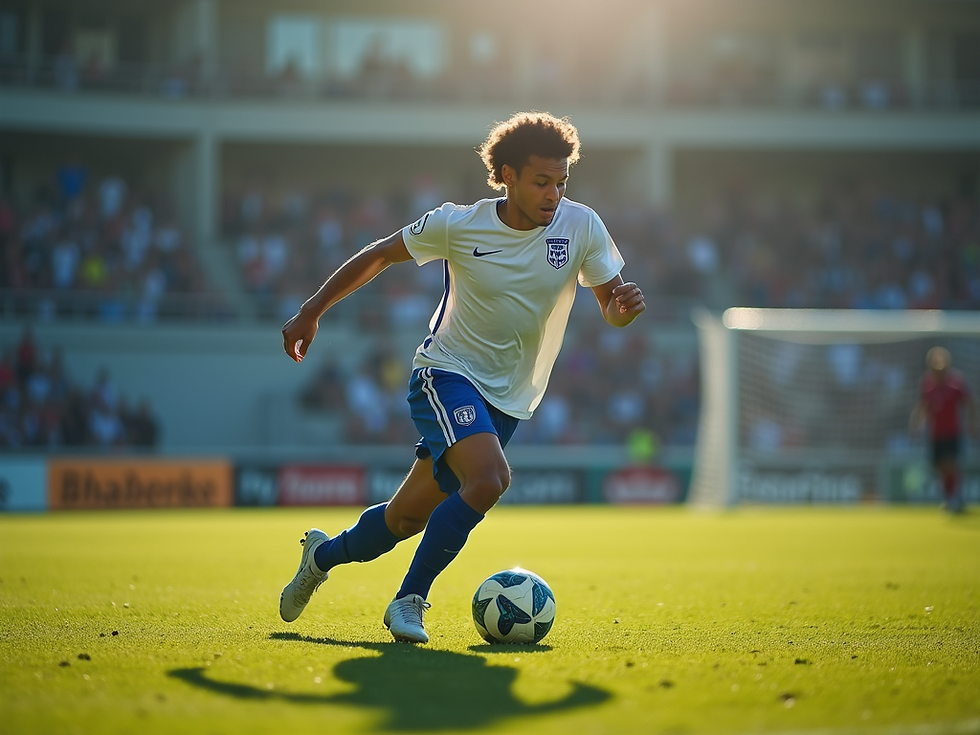How CBT for Footballers Can Transform Mental Performance: A Complete Guide
- Dr Paul McCarthy

- Aug 9, 2025
- 13 min read

Introduction to CBT for Footballers
In the high-pressure world of football, physical training alone isn’t enough to achieve peak performance. CBT for footballers has emerged as a crucial psychological intervention that addresses both performance enhancement and mental wellbeing. While the physical aspects of football receive significant attention, the mental game often determines who excels under pressure and who falters when it matters most.
Cognitive Behavioral Therapy (CBT) provides footballers with practical techniques to manage thoughts, emotions, and behaviors that impact performance. From Premier League professionals to amateur players, the principles of CBT can help footballers at all levels overcome mental barriers and reach their full potential on the pitch.
What is CBT and How Does it Work for Footballers?
Understanding CBT for Footballers: Core Principles
CBT for footballers is a structured psychological approach that focuses on identifying and changing negative thought patterns that affect performance and wellbeing. Unlike traditional therapy, CBT is action-oriented and provides practical tools that players can apply immediately in training and match situations.
The core principle behind CBT is that our thoughts influence our emotions, which in turn affect our behaviors. For footballers, negative thoughts like “I’ll miss this penalty” or “I always perform poorly against this team” can trigger anxiety, reduce confidence, and ultimately impair performance.
The Science Behind Mental Training
Modern sports psychology approaches emphasize the connection between mental wellbeing and physical performance. CBT represents one of the most evidence-based interventions within sports psychology, with numerous studies demonstrating its effectiveness for athletes across different sports.
The field of sports psychology has evolved to address the specific needs of team sports like football. Research shows that mental skills training can improve reaction time, decision-making, and performance under pressure – all critical factors in football success.
Benefits of CBT for Footballers
When implemented correctly, CBT for footballers can significantly improve performance under pressure. The benefits extend beyond match day, positively impacting training quality, team dynamics, and overall wellbeing.
Performance Enhancement Benefits
Improved Focus and Concentration CBT techniques help players maintain focus during critical moments and ignore distractions.
Enhanced Emotional Regulation Players learn to manage frustration, anger, and disappointment effectively during matches.
Reduced Performance Anxiety CBT provides tools to transform pre-match nerves into productive energy.
Better Decision-Making Under Pressure Cognitive techniques improve split-second decision-making abilities on the pitch.
Beyond Performance
Addressing mental health in sports is now recognized as crucial for sustainable athletic performance. CBT offers footballers tools to manage:
Depression and anxiety symptoms (which affect 16.7% to 39% of professional players)
Stress from competition, media scrutiny, and fan expectations
Recovery from injuries and setbacks
Transition challenges (promotion, relegation, transfers)
The conversation around mental health in sports has evolved significantly in recent years, with more players openly discussing psychological challenges. CBT provides a framework for addressing these issues proactively rather than reactively.
Common Mental Challenges Footballers Face
Performance Pressure and Expectations
Footballers face unique pressures, including:
Match-deciding moments (penalties, crucial saves)
Media and social media scrutiny
Financial implications of performance
Team and coach expectations
Managing Pre-Match Nerves
Performance anxiety therapy techniques help footballers manage pre-match nerves effectively. CBT approaches this by:
Identifying anxiety triggers
Challenging catastrophic thinking
Developing pre-performance routines
Using controlled breathing and relaxation techniques
Many footballers report significant benefits from performance anxiety therapy sessions, particularly for high-stakes matches and tournaments.
Injury Recovery and Mental Resilience
The psychological impact of injuries often exceeds the physical challenges. CBT helps players:
Maintain a positive mindset during rehabilitation
Set realistic recovery goals
Manage fear of re-injury
Return to play with confidence
How to Implement CBT Techniques in Football: A Step-by-Step Guide
Step 1: Awareness and Identification
The first step in CBT for footballers involves becoming aware of negative thought patterns. Players learn to identify automatic thoughts that arise during training and matches, such as:
“I always choke under pressure”
“The coach is going to substitute me after that mistake”
“I’ll never be good enough for this level”
Practical Exercise: Keep a thought diary after training sessions and matches, noting situations, thoughts, emotions, and subsequent performance.
Step 2: Challenge Negative Thoughts
Once negative thoughts are identified, players learn to challenge them by:
Examining evidence for and against the thought
Considering alternative perspectives
Evaluating the actual likelihood of feared outcomes
Practical Exercise: For each negative thought, write down evidence that contradicts it and create a more balanced alternative thought.
Developing Mental Skills
The principles of CBT for athletes can be specifically tailored to address the unique challenges footballers face. Key mental skills include:
Visualization and Mental Rehearsal Mentally rehearsing successful performance helps build neural pathways for actual execution.
Goal-Setting Frameworks Setting SMART goals (Specific, Measurable, Achievable, Relevant, Time-bound) for both performance and process.
Attention Control Training Developing the ability to focus attention where it’s most needed and shift focus appropriately.
Research shows that CBT for athletes, including footballers, leads to measurable improvements in performance when these skills are practiced consistently.
Step 3: Develop Coping Strategies
CBT helps footballers develop practical coping strategies for challenging situations:
Pre-Performance Routines Consistent routines before matches or specific actions (like taking penalties) create a sense of control and familiarity.
Mindfulness and Present-Moment Focus Techniques to stay focused on the current moment rather than dwelling on past mistakes or worrying about future outcomes.
Self-Talk Modification Replacing negative self-talk with constructive, motivating statements.
Arousal Regulation Techniques to either increase energy or calm nerves, depending on what’s needed.
Step 4: Practice and Integration
Mental skills, like physical skills, require consistent practice:
Incorporate mental training into daily routines
Practice techniques during training before applying them in matches
Review and refine strategies based on experience
Case Studies: CBT Success Stories in Football
Youth Player Development
A notable case study involved a 12-year-old footballer struggling with trial anxiety:
Eight-week CBT intervention focusing on thought challenging and emotional regulation
Significant reduction in pre-match anxiety
Improved performance in pressure situations
Enhanced communication with teammates and coaches
Professional Player Recovery
A professional midfielder recovering from a serious knee injury used CBT to:
Manage frustration during rehabilitation
Overcome fear of re-injury
Gradually rebuild confidence through graded exposure
Successfully return to pre-injury performance levels
Team-Wide Implementation
A professional club implemented a team-wide CBT program resulting in:
Improved resilience after losses
Better team communication during high-pressure matches
Reduced performance anxiety in younger players
More consistent performance throughout the season
How Professional Clubs Implement CBT
CBT for footballers has become an essential component of mental training in modern football. Professional clubs typically implement CBT through:
Integrated Support Framework
Level | Support Type | Provider |
Basic | Mental wellbeing promotion | All performance staff |
Intermediate | Performance psychology | Sports psychologists |
Advanced | Clinical support | Mental health clinicians |
Key Implementation Strategies
Regular Assessment Psychological screening to identify players who might benefit from additional support
Individual and Group Sessions Combination of one-on-one therapy and team-based mental skills training
Crisis Support Specialized interventions for acute challenges (major injuries, performance slumps)
Coach Education Training coaching staff to reinforce psychological principles in daily training
Many professional clubs now incorporate CBT for footballers as part of their standard training regimen, recognizing its value for both performance enhancement and player wellbeing.
Getting Started with CBT as a Footballer
For Individual Players
Seek Qualified Support Look for sports psychologists with experience working with footballers
Start with Self-Help Resources Books, apps, and online resources can provide an introduction to CBT principles
Practice Consistently Integrate mental skills training into your regular routine
Track Progress Keep a journal of your mental training and note improvements in performance
For Coaches and Teams
Create a Supportive Environment Normalize conversations about mental aspects of performance
Bring in Experts Consider working with qualified sports psychologists
Integrate Mental Skills Training Incorporate brief CBT exercises into regular training sessions
Model Positive Thinking Demonstrate healthy thought patterns and emotional regulation
Conclusion: The Future of CBT in Football
As football continues to evolve, the mental aspect of the game will only grow in importance. CBT for footballers represents a scientifically-validated approach to developing mental skills that enhance performance and support wellbeing.
The most successful players and teams of the future will likely be those who invest as much in mental training as they do in physical conditioning. By understanding and applying CBT principles, footballers at all levels can develop the mental resilience and skills needed to perform at their best when it matters most.
Whether you’re a professional player, a developing talent, or a coach looking to support your team, CBT offers practical, evidence-based strategies to transform mental performance on the pitch.

How to Use CBT for Footballers: A Complete Mental Training Guide
Introduction: Why Mental Training Matters in Football
Football demands peak physical and mental performance. While players spend countless hours perfecting their technical skills and physical fitness, the mental aspect often determines who excels under pressure and who falters when it matters most. This is where Cognitive Behavioral Therapy (CBT) for footballers becomes a game-changing approach.
CBT for footballers provides practical tools to manage pre-match anxiety and improve focus during critical moments. This structured psychological approach helps players identify and change negative thought patterns that affect performance, replacing them with more helpful alternatives.
Whether you’re a professional player facing the pressures of high-stakes matches, a youth player developing your skills, or a coach looking to support your team’s mental performance, this guide will show you how to implement CBT techniques specifically tailored for football.
Understanding CBT for Athletes: Core Principles for Footballers
What is CBT and How Does it Work?
CBT is a practical, goal-oriented form of therapy that helps people identify and change negative thinking patterns. For footballers, these negative patterns might include:
“I always choke under pressure”
“I’ll never be good enough for this level”
“The coach will substitute me after that mistake”
“I can’t perform well against this opponent”
These thoughts trigger anxiety, reduce confidence, and ultimately impair performance. CBT works by:
Identifying these automatic negative thoughts
Challenging their accuracy and usefulness
Replacing them with more balanced, helpful thoughts
Developing new behavioral responses
The principles of CBT for athletes can be specifically tailored to address the unique challenges footballers face. Unlike traditional therapy, CBT is action-oriented, providing tools that players can apply immediately in training and match situations.
Sports Psychology: How CBT Fits into Football Mental Training
Modern sports psychology approaches emphasize the connection between mental wellbeing and physical performance. CBT represents one of the most evidence-based interventions within sports psychology, with studies showing its effectiveness for:
Reducing performance anxiety
Improving concentration
Enhancing emotional regulation
Building resilience after setbacks
Speeding recovery from injuries
The field of sports psychology has evolved to address the specific needs of team sports like football. Research shows that mental skills training can improve reaction time, decision-making, and performance under pressure – all critical factors in football success.
Benefits of Using CBT for Footballers
Implementing CBT for footballers requires consistent practice and integration with physical training routines. When done correctly, the benefits are substantial:
Performance Enhancement
Improved Focus and Concentration
Maintain attention during critical moments
Filter out distractions (crowd noise, opponent tactics)
Stay present rather than dwelling on past mistakes
Better Emotional Regulation
Manage frustration after referee decisions
Control nerves before important matches
Channel pre-match excitement productively
Enhanced Decision-Making
Make clearer decisions under pressure
Reduce hesitation in key moments
Improve tactical awareness
Consistent Performance
Reduce performance fluctuations
Perform well regardless of conditions
Maintain quality across different competitions
Mental Health in Sports: Why Footballers Need Psychological Support
Addressing mental health in sports is now recognized as crucial for sustainable athletic performance. Beyond performance enhancement, CBT helps footballers with:
Managing stress from competition and expectations
Preventing and addressing anxiety and depression
Building healthy coping mechanisms
Maintaining work-life balance
Handling media scrutiny and public attention
The conversation around mental health in sports has evolved significantly in recent years, with more players openly discussing psychological challenges. CBT provides a framework for addressing these issues proactively rather than reactively.
Common Mental Challenges Footballers Face
Pressure Situations
Footballers regularly face high-pressure situations that can trigger anxiety:
Penalty kicks
Final minutes of close matches
Important tournaments
Comeback attempts after conceding goals
These moments test mental resilience and can trigger negative thought patterns that impair performance.
Performance Anxiety Therapy: Techniques for Match-Day Nerves
Performance anxiety therapy techniques help footballers manage pre-match nerves effectively. Many footballers report significant benefits from performance anxiety therapy sessions, particularly for high-stakes matches and tournaments.
Common symptoms of performance anxiety include:
Racing thoughts
Physical tension
Difficulty concentrating
Sleep disturbances before matches
Excessive worry about making mistakes
CBT addresses these symptoms by targeting both the thoughts that fuel anxiety and the physical responses they trigger.
Injury Recovery Challenges
Injuries present both physical and psychological challenges. Players often struggle with:
Fear of re-injury when returning to play
Loss of confidence in previously automatic movements
Frustration with rehabilitation timelines
Concerns about losing their position in the team
CBT techniques can address these challenges by helping players maintain a positive mindset during recovery and build confidence for their return.
How to Implement CBT for Footballers: Step-by-Step Guide
Step 1: Become Aware of Your Thought Patterns
The first step in CBT for footballers is developing awareness of your thoughts and how they affect your performance.
Action Steps:
Keep a thought diary for 1-2 weeks
After training sessions and matches, write down:
Situations that triggered strong emotions
Your automatic thoughts in those moments
How those thoughts made you feel
How they affected your performance
Look for patterns in your thinking
Example:
Situation: Missed an open goal
Thoughts: "I'm terrible at finishing. I'll probably miss the next one too."
Feelings: Embarrassed, anxious
Performance impact: Avoided shooting opportunities for rest of match
This awareness helps you identify which thought patterns are most disruptive to your performance.
Step 2: Challenge Unhelpful Thoughts
Once you’ve identified negative thought patterns, the next step is learning to challenge them.
Action Steps:
For each negative thought, ask yourself:
Is this thought based on facts or assumptions?
What evidence contradicts this thought?
Am I overgeneralizing from one incident?
Would I say this to a teammate?
What would a supportive coach say instead?
Create more balanced alternative thoughts
Example:
Negative thought: "I always choke in big matches"
Challenge: "Actually, I've performed well in several important games. One bad performance doesn't mean I always choke."
Balanced thought: "I've succeeded under pressure before and can do it again. I'll focus on my preparation."
Step 3: Develop Practical Coping Strategies
Applying Sports Psychology Principles on the Pitch
Research shows that CBT for athletes, including footballers, leads to measurable improvements in performance when combined with practical coping strategies.
Key Strategies:
Pre-Performance Routines
Develop a consistent pre-match routine
Include physical, mental, and technical elements
Use the routine before high-pressure situations (like penalties)
Controlled Breathing
Practice 4-7-8 breathing (inhale for 4, hold for 7, exhale for 8)
Use during breaks in play to reset mentally
Incorporate into pre-match routine
Visualization
Mentally rehearse successful performance
Include all senses in your visualization
Practice visualizing both process and outcome
Visualize successfully handling challenges
Self-Talk Modification
Identify your current self-talk patterns
Develop performance-enhancing statements
Create specific self-talk for different match situations
Practice using these statements during training
Step 4: Practice During Training Before Applying in Matches
The key to successful implementation is practicing CBT techniques during training before applying them in competitive situations.
Action Steps:
Create training scenarios that trigger your challenging thoughts
Practice applying your coping strategies in these situations
Gradually increase the pressure in training
Reflect on what works and refine your approach
Example Training Integration:
During shooting practice, deliberately create pressure situations
Apply breathing techniques before each shot
Use positive self-talk when you miss
Visualize successful execution before attempting difficult skills
Step 5: Build a Support System
Addressing Mental Health in Sports Through Regular Practice
Proactive approaches to mental health in sports can prevent performance slumps and burnout. Building a support system is crucial for consistent application of CBT techniques.
Action Steps:
Share your mental training goals with coaches and trusted teammates
Consider working with a sports psychologist for personalized guidance
Schedule regular check-ins to review progress
Create accountability for practicing techniques
Working with a qualified sports psychology professional can accelerate your progress with CBT techniques. Many clubs now provide access to mental health professionals, but individual players can also seek support independently.
Evidence-Based CBT for Athletes in Football Contexts
Case Study 1: Overcoming Penalty Anxiety
A professional midfielder struggled with penalty kick anxiety after missing in an important match. Through CBT, he:
Identified catastrophic thinking patterns (“I’ll definitely miss”)
Developed a consistent pre-penalty routine
Practiced visualization of successful penalties
Created specific self-talk for penalty situations
After six weeks of practice, his penalty conversion rate improved from 60% to 85% in training and matches.
Case Study 2: Return from Injury
A defender recovering from ACL surgery used CBT to address fear of re-injury:
Challenged thoughts about inevitable re-injury
Used graded exposure to gradually rebuild confidence
Developed specific self-talk for tackling situations
Implemented relaxation techniques when feeling anxious
This approach helped him return to play with confidence and without the hesitation that often follows serious injuries.
Case Study 3: Team Implementation
A professional club implemented team-wide CBT training with these results:
Improved resilience after conceding goals
Better communication during pressure situations
Reduced performance anxiety in younger players
More consistent performance throughout the season
Many professional clubs now incorporate CBT for footballers as part of their standard mental training programs, recognizing its value for both performance enhancement and player wellbeing.
Specialized Performance Anxiety Therapy for Footballers
Managing Pre-Match Nerves
Specialized performance anxiety therapy can be particularly helpful before important tournaments or finals. Effective techniques include:
Reframing Anxiety as Excitement
Recognize that physical symptoms of anxiety and excitement are similar
Practice labeling pre-match feelings as “excitement” rather than “anxiety”
Use statements like “I’m excited for this challenge” instead of “I’m nervous”
Progressive Muscle Relaxation
Learn to systematically tense and relax muscle groups
Practice daily for 10-15 minutes
Use abbreviated versions before matches
Attention Control Training
Practice shifting focus between broad awareness and narrow focus
Develop cues to redirect attention when distracted
Create a “reset routine” for after mistakes
Handling In-Match Pressure
For managing anxiety during matches:
Trigger Words
Develop personal cue words for refocusing (“now,” “focus,” “process”)
Use these words during challenging moments
Practice responding to these cues in training
Mindfulness Techniques
Practice staying present rather than worrying about outcomes
Use sensory awareness (feel of the ball, sound of the crowd)
Implement brief mindfulness during natural breaks in play
How to Get Started with CBT as a Footballer
For Individual Players
Begin with Self-Assessment
Identify your specific mental challenges
Note when and where they occur most often
Consider how they impact your performance
Start with Basic Techniques
Begin with thought awareness and breathing exercises
Practice these daily for at least 2-3 weeks
Keep a journal to track progress
Seek Professional Guidance
Consider working with a sports psychologist
Look for professionals with experience in football
Ask for recommendations from teammates or coaches
Integrate with Physical Training
Allocate specific time for mental training
Practice techniques during technical drills
Gradually apply in more game-like situations
For Coaches Implementing Team-Wide Approaches
Create a Supportive Environment
Normalize conversations about mental aspects of performance
Reduce stigma around mental challenges
Model healthy responses to setbacks
Introduce Concepts Gradually
Begin with simple awareness exercises
Incorporate brief mental skills training into regular sessions
Provide resources for players to learn more
Consider Team Workshops
Bring in qualified professionals for team sessions
Focus on common challenges the team faces
Provide both team and individual follow-up options
Measure and Reinforce Progress
Track relevant performance metrics
Recognize and celebrate mental skills development
Create accountability for regular practice
Conclusion: Making CBT Part of Your Football Journey
Understanding how CBT can help footballers improve performance starts with recognizing the mind-body connection in football. The mental aspect of the game is increasingly recognized as a differentiator at all levels of the sport.
By implementing the CBT techniques outlined in this guide, you can:
Develop greater control over your thoughts and emotions
Perform more consistently under pressure
Recover more effectively from setbacks
Enjoy your football more fully
Remember that mental skills, like physical skills, require consistent practice. Start with small steps, be patient with yourself, and gradually build your mental toolkit. With time and practice, these techniques can become automatic responses that support your performance when it matters most.
Whether you’re looking to overcome specific challenges like performance anxiety or simply want to take your game to the next level, CBT offers evidence-based tools that can make a significant difference in your football journey.








